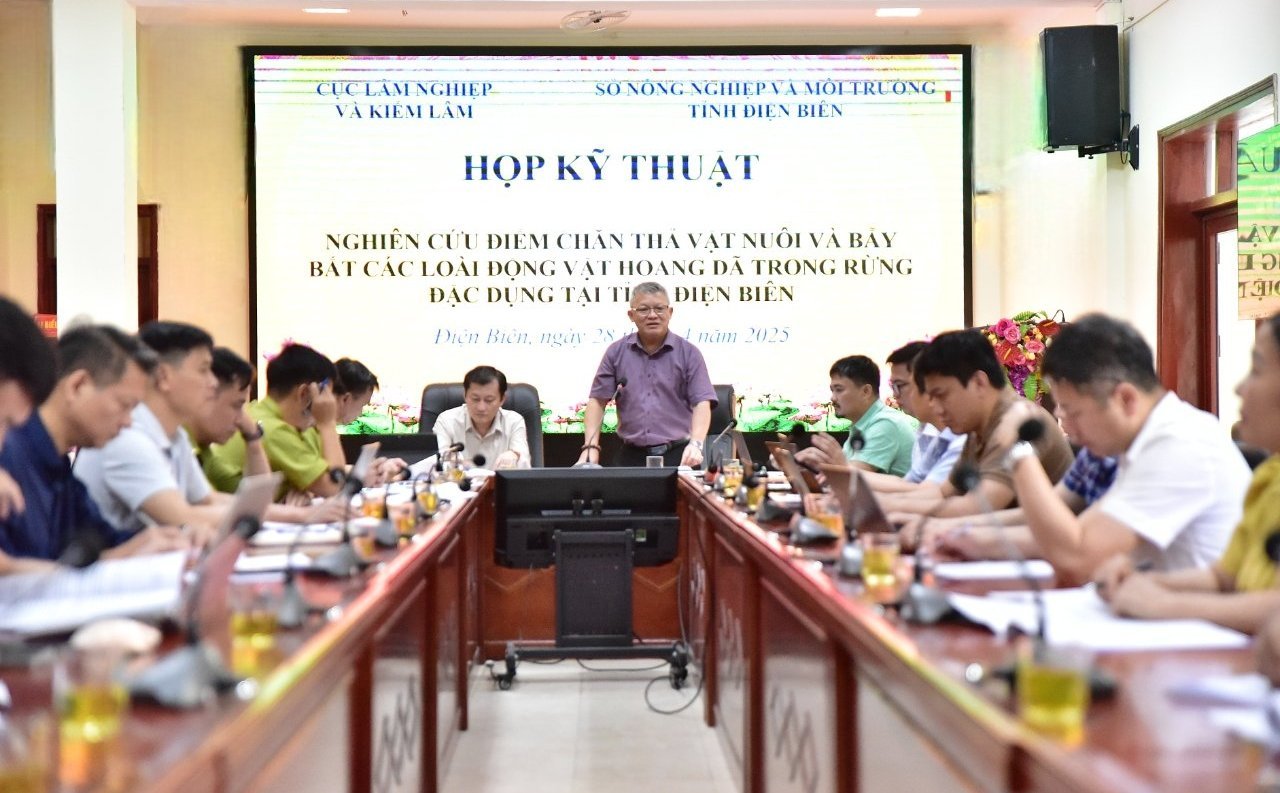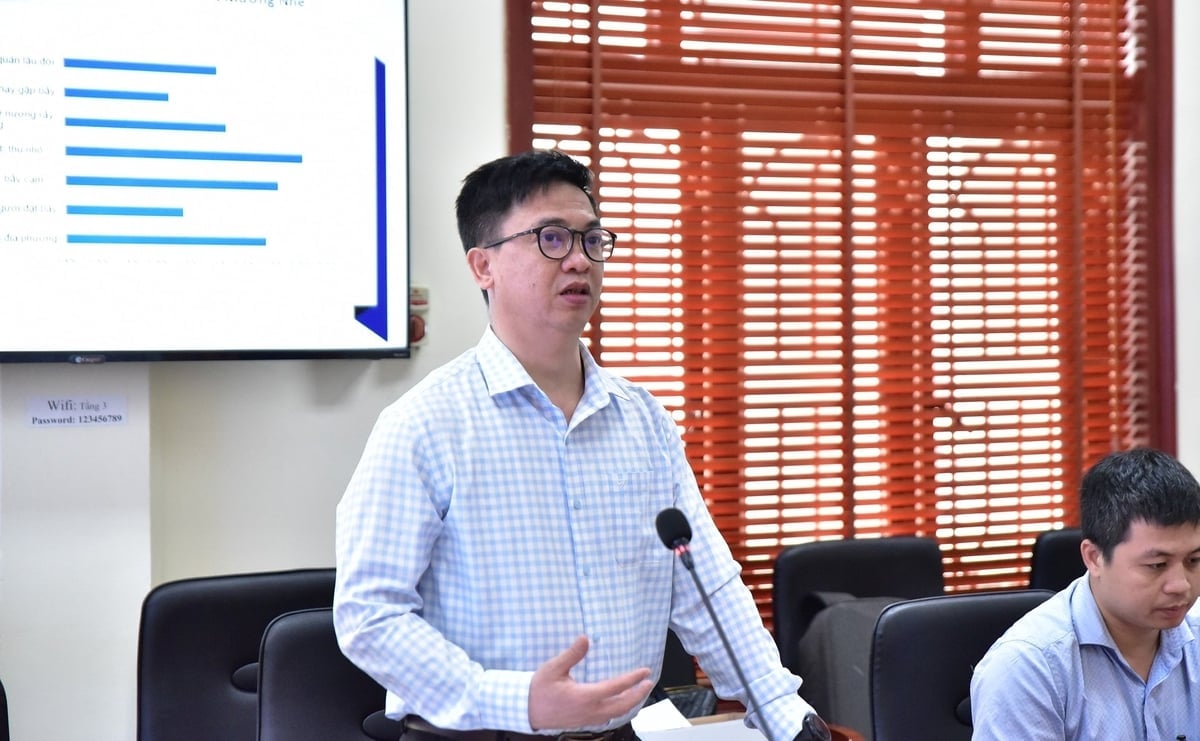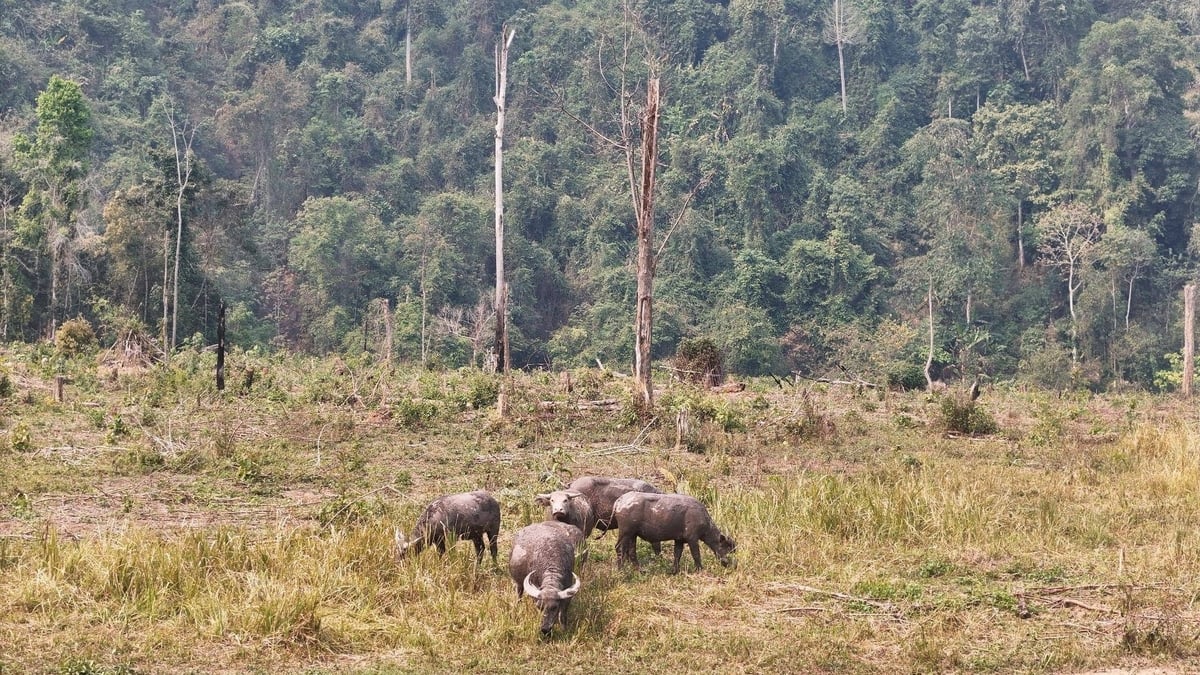December 3, 2025 | 04:45 GMT +7
December 3, 2025 | 04:45 GMT +7
Hotline: 0913.378.918
December 3, 2025 | 04:45 GMT +7
Hotline: 0913.378.918
On the morning of April 28, the Forestry and Forest Protection Department (Ministry of Agriculture and Environment), the Department of Agriculture and Environment of Dien Bien province and the International Union for Conservation of Nature (IUCN), jointly organized a technical workshop on assessing and proposing solutions for livestock grazing and snaring of wildlife in special-use forests in Dien Bien province.

Mr. Doan Hoai Nam, Deputy Director General of the Forestry and Forest Protection Department (right), and Mr. Lo Hong Phong, Deputy Director of the Department of Agriculture and Environment of Dien Bien province (left), co-chaired the meeting. Photo: Kieu Chi.
Mr. Doan Hoai Nam, Deputy Director General of the Forestry and Forest Protection Department, emphasized that the current situation of livestock grazing and wildlife snaring in special-use forests is having a profoundly alarming impact on conservation efforts. These activities disrupt ecosystem processes, lead to habitat loss for other herbivorous species, and increase the risk of zoonotic disease transmission.
The data collection report assessing the current situation and proposing solutions to reduce livestock grazing and wildlife snaring activities in Dien Bien province will lay a solid foundation for the development of the National Strategy to Combat Snaring and Free-range Grazing in Special-use Forests.
According to the expert group's report, the Muong Nhe Nature Reserve conducts approximately 800 patrols annually, detecting between 10 and 15 snares, mostly snare traps and foothold traps.

Associate Professor Dr. Dong Thanh Hai from the Vietnam National University of Forestry presented the assessment report. Photo: Kieu Chi.
A survey conducted across Muong Nhe district also revealed that free-range livestock grazing with supervision occurs in all 11 communes, mainly involving buffaloes, cattle, and goats. Among them, Muong Nhe commune has the largest scale of free-range grazing, with 3,135 buffaloes, 1,540 cattle, and 400 goats.
The proportion of grazing areas in the buffer zone communes of Muong Nhe, Leng Su Sin, Chung Chai, and Nam Ke has been recorded to encroach into the Muong Nhe Nature Reserve, causing degradation of vegetation cover and pollution of soil and water resources.
Notably, most individuals setting snares are believed not to be local residents, making it difficult to detect and handle violations due to the anonymous and mobile nature of the offenders.
Mr. Diep Van Chinh, Director of the Muong Nhe Nature Reserve, reported that, in addition to activities in the buffer zones, large-scale movements of buffaloes into grassland areas within the core zone, near the Vietnam-Laos border, are also occurring. In practice, the use of hunting rifles, handmade guns, and alcohol-powered air rifles to capture buffaloes, even clandestine electric shock methods, constitutes illegal activities that are difficult to control. Forest owners are responsible for strengthening the management and tightening regulations on grazing in special-use forests.
Associate Professor Dr. Dong Thanh Hai, head of the expert group, noted that Dien Bien province has actively integrated snares management into programs such as the Payment for Forest Environmental Services (PES) to create alternative income sources for local communities and reduce pressure on wildlife.
In addition, community awareness of the negative impacts of wildlife snaring has seen positive improvements through advocacy programs and the signing of commitments to protect natural resources.

Free-range grazing area in Muong Nhe District. Photo: Muong Nhe Nature Reserve.
Regarding grazing activities, some households have started adopting semi-intensive livestock farming models combined with grass cultivation, demonstrating the potential for a transition toward more sustainable production. In addition, several alternative livelihood models such as medicinal plant cultivation, beekeeping, and reforestation have been implemented; many local youths have also sought employment elsewhere, contributing to a shift in the local labor force.
Mr. Nguyen Dinh Cuong, Head of the Muong Nhe district Forest Protection Unit, recommended that the Forestry and Forest Protection Department promptly strengthen sanctions and enforce regulations banning grazing within strictly protected zones. He also urged the Department of Agriculture and Environment of Dien Bien province to intensify awareness-raising efforts, encouraging local people to clearly understand the boundaries of special-use forests and distinguish between strictly protected zones and ecosystem management subzones.
At the conclusion of the meeting, the participants agreed on the need to issue targeted support policies for alternative livelihoods, concretize models such as ecotourism development focusing on activities like cultivating medicinal plants under forest canopies, and recognize the integration of grazing management into programs such as PES and Reducing Emissions from Deforestation and Forest Degradation (REDD+) as viable approaches to promote local economic development while protecting natural resources.
The 11 communes in Muong Nhe district covered in the assessment include: Quang Lam, Pa My, Nam Ke, Muong Toong, Huoi Lech, Nam Vi, Muong Nhe, Chung Chai, Leng Su Sin, Sen Thuong, and Sin Thau.
Translated by Kieu Chi

(VAN) Con Dao National Park officially received its Green List status after it was announced at the IUCN World Conservation Congress in Abu Dhabi in October.

(VAN) The National Assembly’s inspection delegation called for a renewed approach to marine economic development, the removal of legal 'bottlenecks,' and strengthened marine environmental protection.

(VAN) The inevitable path forward is to reorganize production along the value chain, utilizing cooperatives as the core, enterprises as the driving force, and farmers as the central subjects.

(VAN) On November 28, Minister Tran Duc Thang, together with China's Minister of Agriculture and Rural Affairs Han Jun, chaired the 2nd meeting of the Viet Nam - China Agricultural Cooperation Committee.

(VAN) Forest carbon credits are only accepted when they ensure absolute environmental integrity, additionality, permanence, and transparency.

(VAN) Viet Nam partners with Beijing on controlling air pollution, cross-regional management, high-tech monitoring and relocating polluting facilities.

(VAN) With a USD 50 million investment, Australia is partnering with Viet Nam to operate its first public electric bus fleet and develop a nationwide EV charging network.